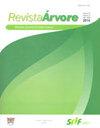BIOMASS OF TWO Eucalyptus CLONES (E. grandis × E. urophylla) IRRIGATED WITH SALINE WATER
IF 0.8
4区 农林科学
Q4 FORESTRY
引用次数: 0
Abstract
ABSTRACT Using saline water for irrigation relies on strategies that include selecting salt-tolerant cultivars and leaching salts away from zones close to the roots. A greenhouse experiment was carried out to assess early growth and biomass production of two Eucalyptus clones (E. grandis × E. urophylla), CO 865 and CO 1407, irrigated with saline water and under different leaching fractions. Treatments were laid out in a randomized block design and arranged in a 4 × 2 + 2 factorial scheme: four leaching fractions (3, 10, 20, and 30 % of crop water demand for plants irrigated with saline water), two Eucalyptus clones (VCC 865 and CO 1407), and two additional treatments, one for each clone, conventionally irrigated with fresh water. The treatments were replicated four times. Measurements were made at 114 days after transplanting. Soil salinity decreased with increasing leaching fraction where VCC 865 was grown; however, leaf dry weight production was lower in treatments irrigated with saline water. Compared to fresh water-irrigated plants, irrigation with saline water resulted in lower: canopy diameter, leaf number, dry leaf mass, dry root mass, aerial parts dry mass, aerial part/root ratio, and total plant dry weight. Overall, the VCC 865 Eucalyptus clone performed better under saline irrigation than CO 1407.盐水灌溉下两个大桉无性系×尾叶桉无性系生物量的变化
使用盐水灌溉依赖于一些策略,包括选择耐盐品种和从靠近根部的区域沥出盐分。通过温室试验,研究了大尾叶桉(E. grandis × E. urophylla) 2个无性系CO 865和CO 1407在盐水灌溉和不同浸出分数条件下的早期生长和生物量。处理采用随机区组设计,并按4 × 2 + 2因子方案进行安排:4个浸出馏分(盐水灌溉作物需水量的3、10、20和30%),2个桉树无性系(VCC 865和CO 1407),以及2个附加处理,每个无性系1个,常规用淡水灌溉。这些治疗重复了四次。移植后114天测量。随着VCC 865浸出分数的增加,土壤盐分降低;而盐水灌溉处理的叶片干重产量较低。与淡水灌溉植株相比,盐水灌溉植株的冠层直径、叶片数、干叶质量、干根质量、地上部干质量、地上部/根比和植株总干重均较低。总体而言,VCC 865桉树无性系在盐水灌溉下的表现优于CO 1407。
本文章由计算机程序翻译,如有差异,请以英文原文为准。
求助全文
约1分钟内获得全文
求助全文
来源期刊

Revista Arvore
FORESTRY-
CiteScore
1.00
自引率
0.00%
发文量
32
审稿时长
4-8 weeks
期刊介绍:
A Revista Árvore é um veículo de comunicação científica da Sociedade de Investigações Florestais – SIF. O jornal é de acesso gratuito, revisado por pares, que publica bimestralmente trabalhos científicos originais no campo da Ciência Florestal. As áreas temáticas para publicação são: Ambiência e Conservação da Natureza, Manejo Florestal, Silvicultura e Tecnologia da Madeira e Utilização de Produtos Florestais.
A política editorial visa manter alta conduta ética em relação à publicação e aos seus funcionários, rigor na qualidade dos artigos científicos, seleção de revisores qualificados, respeito profissional aos autores e processo de tomada de decisão imparcial. A Revista Árvore publica artigos apenas em inglês.
Artigos de revisão podem ser publicados se houver uma discussão relevante resumindo o estado da arte sobre o assunto. A revisão estrita da literatura não é aceita.
 求助内容:
求助内容: 应助结果提醒方式:
应助结果提醒方式:


